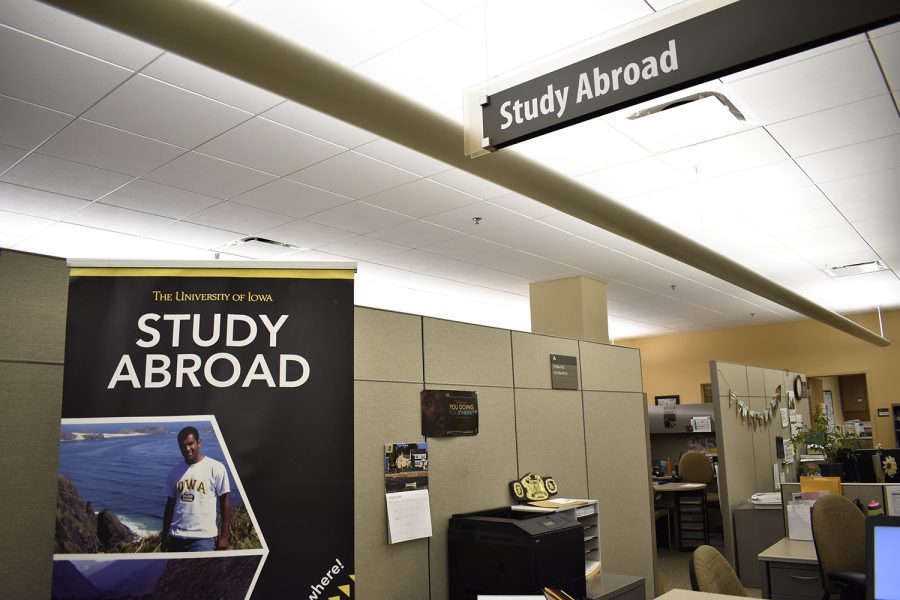Newby: Students should consider studying abroad
Studying abroad brings students to a place of success in several areas.
The University of Iowa Study Abroad Office in the Old Capitol Mall is seen on Tuesday, Sept. 25, 2018.
February 12, 2019
The opportunity only arrives during a four-year stretch at either a college or university. And it’s one roughly 10 percent of overall American graduates choose to explore.
The need for — and benefit of — this experience-driven, education-centered endeavor is extended far beyond the walls of any university or institution. And so, why aren’t more people doing it?
Studying abroad brings students to a place of absolute discovery — where they are immersed in the treasure of new community and culture-sodden course schedules. And with the University of Iowa, there are anywhere from three-week-long to semester-long to yearlong study-abroad trips.
The encouragement for students to take their studies overseas stems partially from a need in the workplace for more compassionate and culturally competent people — or people who have experienced countries and cultures outside of their comfort zone.
RELATED: UI student travels to Nepal to learn about human trafficking
According to a NAFSA survey done in 2014, almost 40 percent of companies said they had missed international business opportunities because of their lack of internationally competent personnel.
“When 95 percent of consumers live outside of the United States, we cannot afford to ignore this essential aspect of higher education,” NAFSA said on its website.
Meanwhile, only 2 percent of total students in Iowa pursue international-study programs during their time at a four-year institution — slightly more than 5,000 students in a pool of more than 250,000.
And for those who do choose to study abroad, they see faster hiring-rates, lower unemployment rates, and more success in getting accepted into graduate school.
“By living and learning abroad, IES Abroad students develop highly sought-after professional skills — adaptability, communication, self-awareness, confidence — that not only make them more hirable, but also launch their career,” IES Abroad said on its website.
Slightly more than 97 percent of students who have studied abroad are hired in their first 12 months after graduating — and with that, they often receiver higher starting salaries, according to IES Abroad.
Along with that, 90 percent of students who have studied abroad were accepted into either their first or second choice for graduate school. For the students entering into the job market or workplace, 85 percent said they felt better prepared and equipped because of the valuable skills they earned through their experience studying abroad.
RELATED: UI student stumbles on modeling career while abroad
Although studying abroad brings with it a slew of questions, worries, and concerns, there is a place to find comfort. Advisers at the UI International Programs are available for walk-ins throughout the week, and they will talk through plans, ideas, and trips with students until they find one best suited for that individual.
And while two of the biggest hesitations facing students are finances and practicality, there are scholarships offered along with financial aid — something that a student’s major-specific adviser can help with.
The UI is full of supportive staff and faculty who are more than determined to do what is best for students in the success of their overall education as well as their future careers.
And though it’s a scary thing to roll out of our comfort zone and into an area completely foreign to us, it’s there that growth grabs us and helps us become better, kinder, more compassionate and innately curious.
With more than 200 study-abroad programs, there is bound to be something for everybody — whether that be a single course, numerous classes, or internships — offered through UI International Programs.






